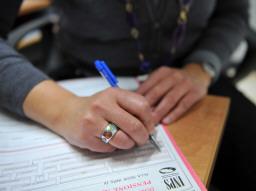Senate Speaker Renato Schifani called for action to stamp out sexual discrimination on Thursday, as a new report showed Italian women hold far fewer key decision-making posts than their European sisters.
Speaking ahead of International Women's Day this Sunday, Schifani said the festival should not just be a ''ritual celebration'' but should also give pause for thought.
''We should look at how much still remains to be done to ensure not just formal equality - recognized with great foresight by the drafters of the Italian constitution in Article 3, which places sexual equality as first among all the fundamental equalities - but also concrete and effective equality,'' said the speaker.
''This means that education, the work place, family matters and all other fields must safeguard the dignity, freedom and equality of women, at every level''.
The report by the Council of Europe, based on figures from official Italian sources, found that Italy consistently lags far below the European average in terms of female MPs, ministers, top judges, local councillors and diplomats.
The document compared the situation in 42 of the Council's 47 member states and found that Italy fared poorly in every sector.
The most worrying figure was the level of female representation in local municipal councils, where women made up just 2.2% of councillors compared to a European average of 24.5%. The only country with a worse record in this sector was Azerbaijan.
Italy fared better at a regional government level, where female representation climbed to 17.2%, although still below Europe's average of 21.4% and less than half of Spain's 39.7%.
The Council of Europe report also found a dearth of women holding key posts in Italy's judicial system.
While women on average make up 27.6% of judges in the highest courts of European countries, in Italy, they number just 4.8%.
The Council of Europe is the latest in a series of bodies to criticize Italy's shortcomings in gender equality, particularly at a parliamentary level.
The Geneva-based Inter-Parliamentary Union has ranked Italy 63rd in the world for female participation in politics, finding that women accounted for 17% of its lawmakers.
Yet efforts in 2005 to pass a bill reserving a third of parliamentary seats for women came to nothing when the measure was roundly defeated.
Italy has also has a dismal record in terms of female employment, ranking second to bottom of all European Union countries, according to a report by EU statistics bureau Eurostat.
The study found just 46.9% of Italian women worked compared to the European average of 58.8%. Only Malta clocked up a lower rate at 37.5%, while at the other end of the scale was the Netherlands, topping the league at 70%.
Another report, by think tank Eurispes, further found that working Italian women earn 16% less than their male counterparts.
Speaking on Thursday, Senate Deputy Speaker Vannino Chiti echoed Schifani's sentiments and called for ''a real equality of opportunity between women and men''.
He particularly highlighted the need for better job opportunities and more laws to protect women from domestic violence.
The problem of domestic abuse was also highlighted by the Italian Red Cross Special Commissioner Francesco Rocca, who said this was a growing issue among Italian women turning to the organization's 600 nationwide help centres.
Sounding a more upbeat note, a study conducted by the Equal Opportunities Observatory of Italian skincare company Cera di Cupra found that nearly a third of women work because they love their job.
The survey of over 1,000 women between 18 and 65 noted that work gives 29.7% of women a sense of achievement and fulfilment and 27.8% said they loved their jobs.
Half of those polled said they worked to ensure their economic independence, while just 32.4% said they viewed work as an unpleasant necessity.









